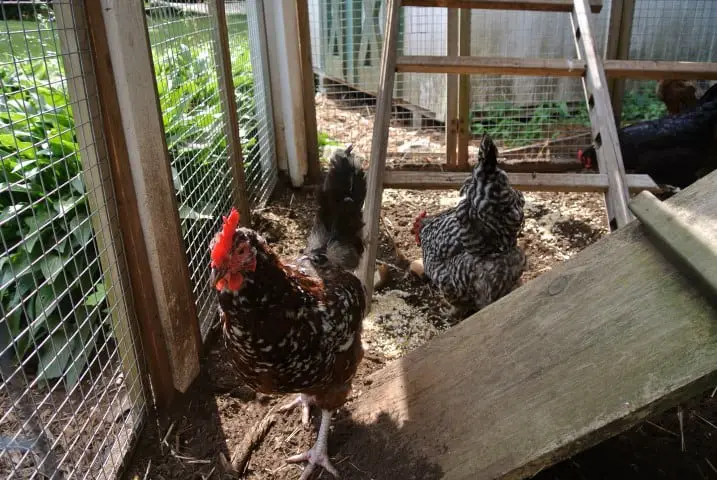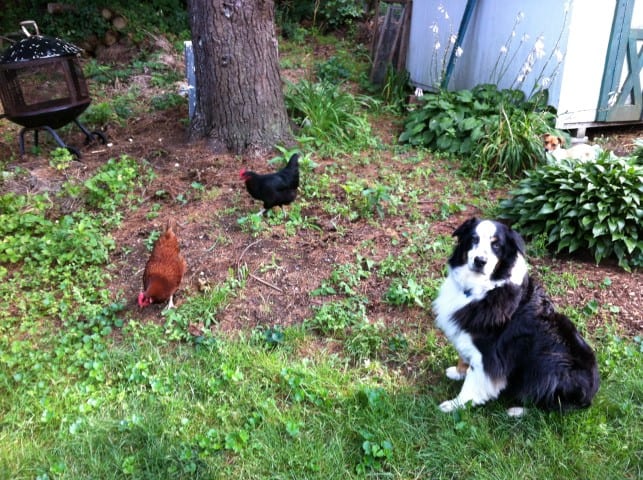Chicken Husbandry

Small Chicken Husbandry in Action
Quick Navigation
All Your Questions Answered…
Chicken Husbandry is for Everybody…
Whether you have several acres or just a small urban plot, chickens make a great addition to a sustainable lifestyle.
Believe it or not, they are wonderful pets with different personalities, are beneficial to composting programs for gardeners and best of all, they are steady producers of organic healthy eggs.
Once you decide to invest the time and energy to start a backyard chicken program, there are a number of things you need to know and some helpful tips to make this new venture successful.
What you need to know…
Before you get your fist batch of chickens, plan to buy or build their living space. There are hundreds of easy to construct kits and plans available on the internet or at local building supply stores.
You can build your own coop and run for about $150 or buy a deluxe pre-built version for $800. There are plenty of cheap chicken coops also available.
There are second hand coops available too so be sure to check around your area and you may find good used coops for sale at very reasonable prices.
Do some research to figure out what is best for you. Of course the first thing to decide is how many chickens you want. These are sociable creatures and like to have at least one friend, so two chickens is really the minimum.
If you are in it for the eggs, a flock of four will produce approximately 18 eggs per week (a few less during the winter months). Chickens need very little space so plan accordingly when buying or building a coop. For a flock of four to eight chickens, a generous fenced in area around the coop only needs to be about 10 x12 feet.
What about Security?
Once your coop is in place, the final chore is to REALLY make sure it is secure. Backyard chickens are very vulnerable to predators. You may rarely see them, but nocturnal critters like coyotes, raccoons, foxes, snakes, cats, etc. are always on the hunt. Look up too…hawks and other birds of prey would love to snag an unsuspecting chicken.
Of course, “free range” chickens should also be considered. They are wanderers and will enjoy following you around as you work in the yard.
While outside the coop, they’ll spend the day eating bugs, digging for worms, pecking away at weeds, etc., all of which is good for the environment. It will also decrease your cost of feed. If you have enough land, free range chickens can actually feed themselves with access to grasses, weeds, insects, wild berries, etc. An added benefit is that their droppings make excellent fertilizer for lawn and soil.
At dusk, the chickens will always return to their coop, so no need to worry about them taking off. One word of caution however. If you have a non fenced in garden, the chickens will dig through your beautifully prepped and seeded rows in the spring as they search for bugs and worms.
What Type of Chickens Should I Buy?
One of the most common questions posed by beginning chicken “farmers” is what type to buy. There are seemingly hundreds of different varieties, but here are some of the most reliable and colorful ones:
Plymouth Rock
These are very docile and good producers of brown eggs. They come as white, or black and white striped (known as barred). Fairly large birds at about 9 pounds.
Leghorn
Originally brought in from Italy, Leghorns have a very high rate of egg production.
Rhode Island Red
Another brown egg layer, these are really pretty rust colored birds, a bit smaller than Plymouth Rocks at about 8 pounds.
Ameracaunas
Fun to have because they lay blue eggs and are easy to recognize due to their fluffy head feathers.
Black Australorps
Beautiful black feathered chicken with nice personalities that produce brown eggs.
Buff Orpingtons
Large (11 pounds) pale orange/cream colored birds that lay brown eggs.
How Much Work is it to Keep a Chicken Flock?
Another common question from beginners is, “How much work is it to keep a chicken flock?” Well, the answer is “not much”.
The only real work is the set up…the coop, the pen area, buying the birds, feed, watering station. On a daily basis, taking care of chickens takes no more effort than feeding your cat and dog.
Once a week you should add another layer of straw or shavings to where they nest and lay eggs, and every couple of months you will have to clean out the coop…a pretty simple job. Otherwise, you just make sure there is feed and water every day and of course, the fun part…gathering the eggs.
Chickens around other Pets?
Chickens are pretty tough characters. We have two Jack Russell terriers, an Australian shepherd, and a Maine Coon cat, and our chickens are unfazed by the ruckus these guys cause!

Chicken and other pets (Small)
We keep the hens inside their run/coop during the spring and summer in order to protect our rather large vegetable gardens. Come fall and winter however, the girls are free range and happily interact with the dogs.
This may be somewhat unusual, but even our Jack Russells, which are bred to kill barnyard varmints, were easily trained to co-exist with the chickens. The cat simply ignores them.
Is it too Cold for me to have Chickens?
They are also very tolerant of the cold snowy winters up here in Massachusetts. On the rare occasion when the temperatures dip down below 10 degrees, we will put some supplemental heat in the coop at night. Otherwise, they are perfectly happy roosting in a tight bunch to generate heat for themselves.
The Benefits of Chicken Husbandry…
1.Fertilizer
Speaking of gardens, if you have a composting program, chickens will be a big help. Chicken manure contains very high quantities of nitrogen and when mixed in the compost pile with “greens” like grass clippings, garden waste, coffee grounds, kitchen scraps, etc., and “browns” such as fall leaves, pine shavings , corn stalks, sawdust, etc., you will end up with a beautiful pile of “black gold” for spreading on your gardens.
2.Fresh Eggs
Crack open one of your home grown eggs beside one you bought at the local supermarket and what a difference! Your eggs will have beautiful orange high rising yolks versus the pale yellow ones from the store, and the whites will be firm and much less runny.
The taste will speak for itself and the eggs are loaded with super rich protein! Providing your family with organic home grown food is a wonderful thing to do and backyard chickens serve as a great complement to vegetable gardens and fruit products.
3.Sustainability
People keep chickens for a variety of reasons, but one that is growing in popularity are the notions of “going green” and ”sustainability”.
The less we travel to the store, the better for the environment and just knowing what’s NOT going into our food (hormones, chemicals, unknown additives, etc.) the better life can be.
What can you Feed Your Chickens?
For most of us, free ranging our birds is not an option, so we have to feed them in their coops. You can either buy commercial feed or grow it yourself. Small grains like barley, oats, rye and wheat are easy to grow and the ever popular sunflowers are great for chickens.
With sunflowers you can simply toss the whole plant head into the coop and the girls will do the rest. They also like all kinds of kitchen scraps…unused lettuce, kale, leftover bread, veggies, and a handful of cracked corn, available at the feed store, is also a nice daily treat.
Remember, chickens don’t have teeth so they need access to sand and small pebbles or other forms of grit in order to grind food in their gizzards.
What about Chicken Housekeeping?
It won’t take long for your chickens to wipe out anything growing in their run, such as lawn and weeds, but this is OK. Now you can lay down a nice layer of bedding like grass clippings, fall leaves, straw, wood chips, sawdust, etc. (More information on chicken bedding here)
As the hen droppings accumulate on this organic bedding, the area turns into gold mine of biological activity full of insects, microbes, earthworms…all excellent sources of feed for the chickens.
Doing your Due Diligence
Raising chickens is rapidly becoming a nationwide pastime. It has spread from the rural farm to the suburbs, and even to the inner city. Who doesn’t like chickens? Well, many people don’t so be prepared to do a little neighborly prep work before you take the plunge.
Obviously, you want to make sure there are no local restrictions on keeping chickens. Next, talk to your immediate neighbors about what your plans are and be prepared to answer some basic concerns they may have. The most common is noise.
Many people assume that keeping chickens for egg production requires a rooster. NOT TRUE! No pre-dawn sound barrier busting squawk is going to shatter the morning calm. Assure them that your laying hens will be happy and very quiet.
Other concerns may be cleanliness, odors and the attraction of vermin. Explain to your neighbors that the chickens will be housed in a clean secure environment and that your tending practices will be efficient and humane.
In all likelihood, you will have an abundance of extra eggs once the laying begins and the occasional gift to wary neighbors goes a long way in keeping everyone happy!
The Conclusion…
Raising chickens is REALLY fun…not a lot of work, and the rewards are numerous. For one thing, you will become hugely popular with all kids in the neighborhood, while doing something good for your family. Join the thousands of chicken keepers around the country. You’ll be glad you did!
Related Articles:

